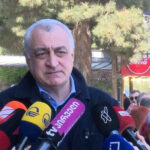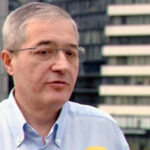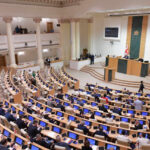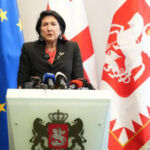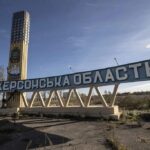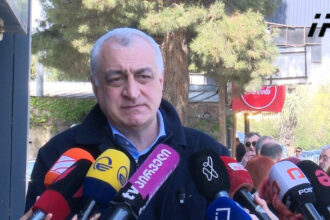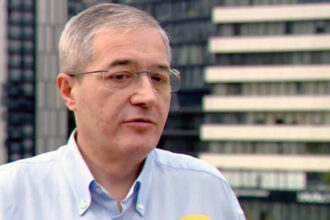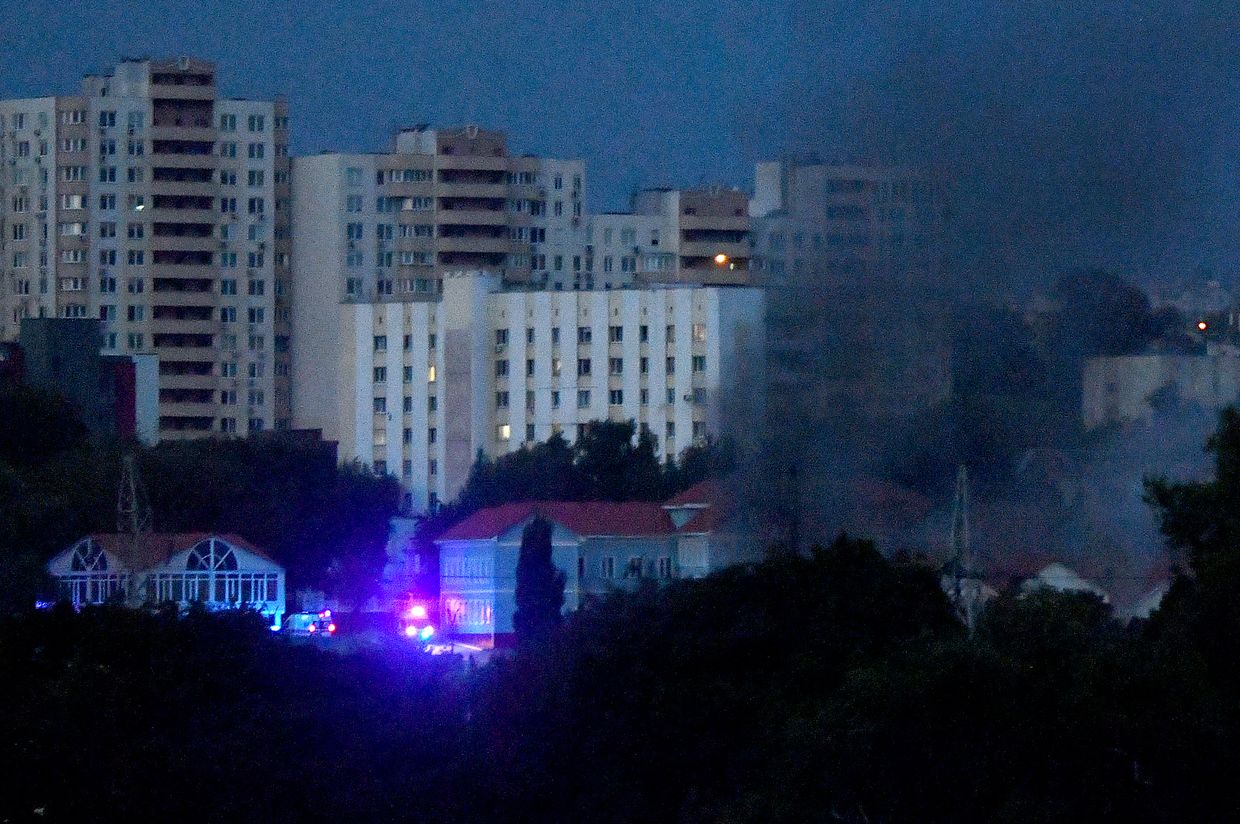In recent weeks, the frequency and destructiveness of Russia’s air attacks against Kyiv has dramatically increased.
Moscow has increased drone strikes against the capital, which was attacked overnight on October 31 for the 20th attack this month. It also reduced the use of ballistic and cruise missiles that are more powerful and difficult to intercept.
The last combined mass drone and missile attack on Kyiv took place nearly two months ago. While this may appear to be a positive development on the surface, it is causing unease among the residents of the capital.
Zakhar Shevchuk, a 32-year-old Kyiv teacher told the Kyiv Independent: “I think that this is a practice for winter.”
“I think that there will be a combination of missiles and drones because there haven’t been any missiles in a long time but there are many drones.”
Since months, Ukrainian officials have warned of a renewed Russian effort to destroy the energy infrastructure of the country. A series of devastating strikes in March and August this year severely damaged the country’s thermal plants and grid connection for hydroelectricity producers.
As a result, the country is heavily reliant on both nuclear power plants and imports.
Oleksiy Brkht, interim head of Ukraine‘s state grid operator Ukrenergo said in an Oct. 29 interview with Suspilne that “the winter will be the worst of the last three year.”
He said that if Russia continued its attacks on critical energy infrastructure, as it did during the winter of last year, Ukrainians could face up to 8 hours of power outages in the most “critical days”.
What are the chances of a successful deal?
According to a report in the Financial Times, Kyiv is holding preliminary talks with Moscow about stopping attacks against each other’s infrastructures. Previous talks had failed following Ukraine’s incursion in Russia’s Kursk Oblast.
According to a senior Ukrainian official quoted in the report, energy infrastructure attacks had already decreased over the past few weeks based on an agreement reached between Ukraine and Russia’s intelligence agencies.
Moscow has denied reports of negotiations.
Liubov bondar, 75, retired worker from a maritime shipping firm, told Kyiv Independent, that even if these reports were accurate, the results would be ineffective.
“Can we trust (Russian president Vladimir) Putin?” She added: “He doesn’t like that our guys are attacking oil refineries.”
“I don’t trust him — he will lie no matter what he says.”
Surging drone strikes
The number of drones that have been launched by Russia against Ukraine has risen to an unprecedented level.
Since the beginning of the full-scale invasion, Ukraine has been attacked every day by drones of the Shahed type. In September alone, more than 1,300 were launched.
The number of attacks has increased dramatically in October, surpassing September’s total on Oct. 23. The vast majority of them are shot down. Some others are jammed by electronic war.
“The attacks have increased.” It’s bad but it’s what it is,” said Olena Syrotina (44), who has lived in Kyiv, Ukraine, since 2015, when she fled Luhansk following Russia’s invasion of Ukraine in 2014.
“Now I can hear the drone buzzing in my apartment.” It had never happened before this month.
“I sleep but when the air defenses fire and the light flashes on my windows, then I wake up and walk to the corridor.”
Syrotina has every right to be cautious. Two people, including a 15 year old girl, have been killed recently in the capital.
Experts who spoke to The Kyiv Independent suggested that the Kremlin may be preparing for a massive attack, rather than restraining itself.
The Kyiv Independent reported that “UAVs” (Unmanned Aerial Vehicles/drones), a senior researcher at the Royal United Service Institute, can be used as a pathfinder.
“A tool that forces (an air defense radar) to light up. This allows the Russians map the layout of defenses in and around Kyiv, as well as other relatively well-defended cities.”
Kaushal and others warn that Moscow’s reliance upon drones rather than missiles is likely to be a sign of an aerial attack of great magnitude in the near future.
Fabian Hoffmann is a defense specialist and doctoral researcher at the University of Oslo. He told the Kyiv Independent that it has been a long time since we have seen a large-scale nuclear strike.
“Part of it could be related to the fact that they are ramping-up not just for one, but possibly several more mass strikes with the goal of disintegrating Ukraine’s electric grid in a short time period,” he said.
It could also be to allow comprehensive follow-up attacks after initial blows are dealt to ensure it cannot be repaired.
What will Russia be targeting?
Oleksandr Kharchenko is the managing director of Energy Industry Research Center (EIR Center) and told the Kyiv Independent it’s virtually impossible to predict the next Russian mass missile attack against Ukraine’s energy infrastructure.
“We cannot say for certain what objects will attack, how they will attack, or how effective air defenses will work in this situation,” said he.
He added that an attack on Ukraine’s energy production would have a greater impact than an attack on the country’s electricity grid.
Last month, in New York the U.N. Security Council heard President Volodymyr Zelensky tell them that Russia is preparing to attack three Ukrainian nuclear power stations.
Few days earlier, Ukraine’s Foreign Minister Andrii Sbiha had said that Russia could target open distribution devices in nuclear power plants and substations for transmission. “These are essential to the safe functioning of nuclear energy system.”
Kharchenko said that an attack on Ukraine’s nuclear sites could lead to a “very, very complex situation.”
On the Ukrainian-held territories, there are three nuclear power plants in operation — Rivne NPPs and Khmelnytskyi NPPs to the west and Pivdennoukrainsk NPPs to the south. Kharchenko said that they account for “55-60%” of electricity consumption.
“It would be painful if the switchyard of a nuclear power station was attacked, damaged or destroyed,” he said.
“If you lose one station, you will be without it for at least three to four weeks. This is because it takes so long to restore the switchyards.”
When will it happen?
Experts and citizens in the capital enjoy predicting when the next major attack will take place.
Kharchenko replied when asked what he thought the date might be. “Well, you should ask the Russians first because they are completely out of common-sense logic,” he said.
Several Telegram channels track the activities of Russian aircraft that are based on airbases used for attacking Ukraine.
One of the most recent reports noted that a large number of people were massing at different airbases. This added to the speculation in Kyiv about a possible attack imminent, but there was still no conclusion.
Shevchuk is a Kyiv teacher who said, “I watch the news and I listen to different analysts’ predictions, because no one knows what’s going on in the Russians’ heads.”
Weather forecasts also are closely monitored because, as Kkarchenko explains if Ukraine’s energy infrastructure is attacked when temperatures drop, it would likely cause greater damage and have more detrimental effects on the country’s economy and war efforts.
He said that it was possible they were waiting for freezing temperatures. Kharchenko said that increased demand in colder temperatures would put more strain on an already damaged system and lead to more blackouts.
“It is also more difficult to repair something in freezing temperatures,” he said.
Kyiv residents have only to prepare themselves as best as they can. Kyiv’s streets are dotted with large generators as bars, restaurants, and shops take steps to stay open in the event of a blackout. Numerous smaller systems have been installed in homes throughout the capital.
Alina Malynovska, 28, told the Kyiv Independent that she was expecting blackouts. “I have an inverter and a battery.” It’s a home charging station that can charge anything.
Some Ukrainians are able to see the benefits of power cuts during colder weather.
Bondar, a pensioner, said, “In winter it will be better because we can store food on the balcony.” “(In the summer), the food would spoil in the fridge.”
Kyiv residents have experienced hardships that are comparable to those of the winter.
Yurii, 45, told the Kyiv Independent that she had survived last winter. She added: “We will survive this one as well.”
Read More @ kyivindependent.com
